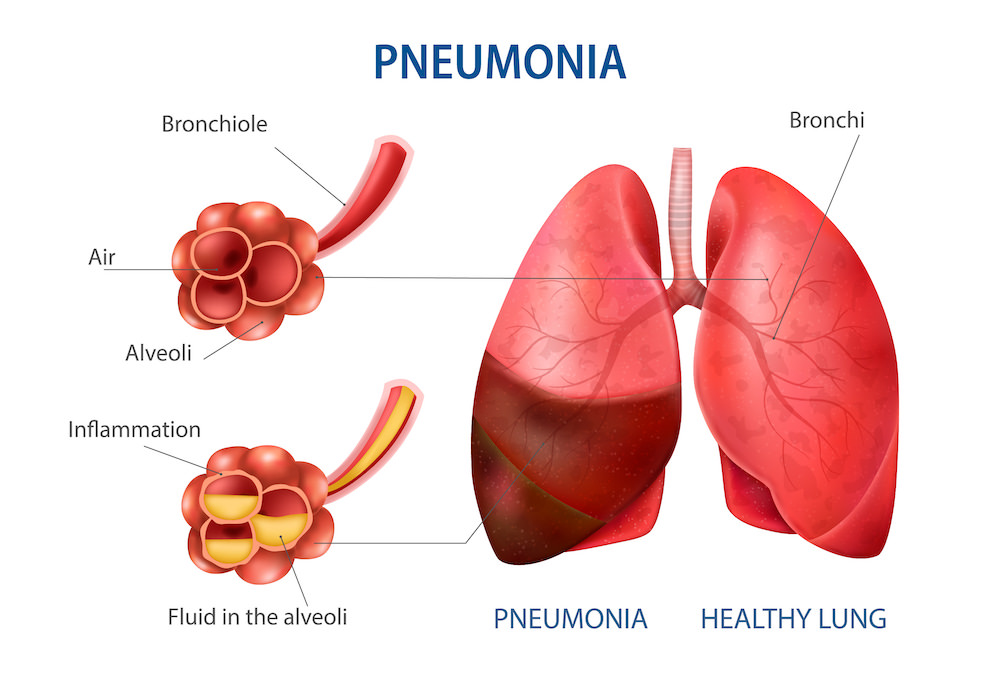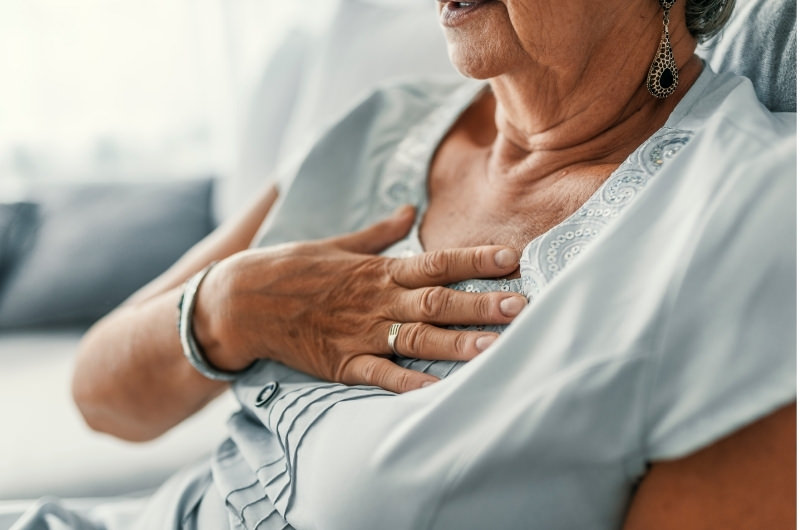An icy cold sensation in your chest could have various causes. It’s easy to speculate that it could be a bacterial or viral infection in your lungs or respiratory system. If it’s accompanied by stinging pain or discomfort in your chest, it could be due to a heart problem. Anxiety or fear may also cause icy cold sensations in your body. If you’re unsure what to do, check your temperature first because you could have a fever. After that, resting, increasing your fluid intake, and keeping yourself warm would be the best treatment you could get at home.
Most people who experience an icy cold feeling in their chest find out it is due to respiratory problems.
However, an icy cold sensation is common when experiencing anxiety attacks or overly worrying about something.
It might be complicated to narrow down the list of possible issues running through your head the moment you feel your chest cold as ice.
Has something been bothering you lately? Did you catch a cold? Do you have a heart attack? Or is the weather just really cold? Is the icy cold pain coming specifically from your breast region?
Below are the possible reasons why your chest is feeling cold as ice.
What’s causing this icy cold feeling in your chest?
1. Respiratory problems
Acute Bronchitis (chest cold)
It’s a common respiratory condition that occurs when a virus enters your airways or bronchial tubes, causing swelling and inflammation.

Mucus or a thick fluid then forms, resulting in a blockage in your airways.
This thickened mucus causes a heavy, cold, or congested feeling in your chest, which could later become coughs.
Acute Bronchitis is also commonly known as a chest cold. Below are the common symptoms of having a chest cold:
- Chest congestion and soreness
- Feeling tired and achy
- Cold heavy feeling in head and chest
- Headache and fatigue
- Fever and chills
- A sore throat
- A stuffy, leaky nose
- Dry cough, which then produces more mucus
Unlike chronic Bronchitis, a chest cold lasts only a few days or up to 2 weeks.
As time passes, you may still experience symptoms like coughing but with lesser mucus.
Antibiotics won’t treat acute Bronchitis as it is not caused by a bacterial infection.
Acute Bronchitis may resolve on its own without any treatment. However, managing your symptoms to avoid complications like pneumonia or chronic Bronchitis would be best.
Below are some of the things you could do to treat yourself at home:
- Get yourself enough sleep
- Stay well-hydrated (if possible, avoid extremely cold drinks)
- Drink cough medicine
- Use decongestants and/or humidify the air
- Stay away from cigarette smoke, dusty places, and heavy fumes
- Drink tea with honey
Other than viral infections like cold or flu, exposure to secondhand smoke and/or allergens like dust particles in the air and heavy, strong fumes may cause chest colds.
Beware also of possible mold in your home causing Bronchitis.
Chest cold vs. COVID-19
COVID-19 infection can cause many common respiratory symptoms, which may mimic a chest cold. However, an icy cold feeling in the chest isn’t one of its reportedly common symptoms.

Below are the differences in symptoms due to a chest cold or a coronavirus infection, specifically SARS-CoV-2.
| Chest Cold | COVID-19 |
|---|---|
| Fever and headaches are rare | Fever and headaches are common |
| Diarrhea does not occur | Diarrhea rarely occurs |
| Sore throat and achy feelings often occur | Sore throat and achy feelings sometimes occur |
| A runny nose is common | A runny nose seldom occurs |
| Sneezing is common | No sneezing occurs |
| Cough with phlegm or mucus | Dry cough, shallow breaths, or breathlessness |
| Symptoms are mild and will stay mild | Symptoms could start mild and worsen |
At most, patients with a chest cold will get better within 7 to 10 days if symptoms are managed well. However, consider getting a COVID test if your symptoms worsen or persist.
Common early symptoms of coronavirus infection include loss of sense of taste or smell, discoloration and/or paleness of skin, fingers, and nails, and mild to severe rashes.
If you doubt you have COVID, please stay at home and isolate yourself. Call on your doctor immediately.
Pneumonia

It occurs when bacteria, viruses, or germs enter your lungs, causing fluid buildup and inflammation of your air sacs.
Sometimes, this occurs when acute Bronchitis isn’t cured or treated.
If you have mild pneumonia, you may experience these symptoms:
- Heavy cough, which may produce greenish, yellow, or even bloody phlegm
- Lower than average body temperature and/or very high fever
- Cold sensations and shaking chills
- Chest pain when you breathe or cough
- Rapid and shallow breathing
Other symptoms like nausea or vomiting, fatigue, and loss of appetite are also signs of pneumonia.
The phlegm that forms in your lungs may disrupt the flow of oxygen in your system, which will cause a high fever and shaking cold.
If you show signs of mild pneumonia, doctors will prescribe you antibiotics (if it is due to a bacterial infection).
Increase your fluid intake, get enough rest, and have an air humidifier to ease the heavy feeling in your chest to manage symptoms.
In case of severe pneumonia, you may have to admit yourself to a hospital.
Asthma
Asthma symptoms, such as a sensation of tightness, pressure, or discomfort in the chest, may mimic an icy cold feeling in your chest.
This sensation may result from inflammation and constriction of the airways. Other symptoms may include wheezing, coughing, and shortness of breath.
2. Heart Problems
Angina
It’s characterized by chest pain or discomfort when the heart muscle doesn’t receive enough oxygen-rich blood.

It’s due to the narrowing or blockage of the coronary arteries, which are responsible for supplying blood to the heart muscle.
Signs of angina may feel like pressure, squeezing, fullness, or pain in the chest. It can also be felt in other body parts like shoulders, arms, neck, jaw, or back.
You may experience cold sweats, nausea, shortness of breath, and the symptoms mentioned earlier during an angina flare-up.
A heart attack
A heart attack happens when oxygen and nutrients don’t reach your heart muscle tissues due to a blockage in one or more of your coronary arteries, resulting in damage or death of the affected heart muscle tissue.
The most distinctive sign of a heart attack is chest pain or discomfort, which usually feels like pressure, tightness, squeezing, or fullness in the chest.
These sensations can also be accompanied by shortness of breath, sweating, nausea, and lightheadedness.
Not all chest pains indicate a heart attack, but you must seek prompt when feeling its symptoms as it’s a serious medical emergency that requires immediate treatment.
Pericarditis
It’s a heart condition that occurs from the inflammation of the pericardium thin, sac-like membrane surrounding the heart.
This inflammation can lead to chest pain, pressure or squeezing sensations, and sometimes, an icy cold feeling in the chest.
Pericarditis may be caused by different factors, such as viral or bacterial infections, autoimmune disorders, or heart attacks.
Treatment for this condition depends on the underlying causes and their severity.
Arrhythmia
An irregular heartbeat is known as an arrhythmia.
It can cause fluttering or palpitations in the chest, and other symptoms such as dizziness, lightheadedness, or fainting may accompany it.
An icy cold feeling in the chest can be a rare symptom too.
Arrhythmia can result from heart disease, stress, or an imbalance in the body’s electrolytes.
3. Thoracic outlet syndrome (TOS)
Thoracic Outlet Syndrome can cause discomfort in the upper part of your body, including your upper chest area, one or both of your upper limbs, hands, armpits, upper back, and neck.
It may be due to compression of your blood vessels and/or nerves in the tight passageways of your lower neck and upper chest area (or the thoracic outlet).
Signs and symptoms vary depending on the affected areas. However, the most common types include:
- Pain, numbness, and cold tingling sensation radiate below the shoulder down towards the hand.
- Skin discoloration (paleness, bluishness, or even redness) with cold sensation if the affected area includes the vascular nerves.
- Arm pain and swelling, possibly due to blood clots.
Treatments for the syndrome usually include:
- Stretching the muscles in your chest
- Strengthening your shoulder muscles
- Head and neck alignment modifications
Changes in your diet for weight loss (overweight patients) will reduce compression in the neck and chest area.
Doctors may also prescribe you some medications. We also have a separate article on tips to sleep better with TOS.
4. Gastroesophageal reflux disease (GERD)
It’s a chronic digestive disorder when stomach acid or other stomach contents flow back into the esophagus, irritating its lining.
The most common symptom of GERD is a burning sensation in the chest (heartburn) that can spread to the throat and result in a sour or bitter taste in the back of your mouth.
Sometimes, patients may also experience cold sensations or numbness.
Other symptoms may include regurgitation, difficulty swallowing, coughing, hoarseness, and chest pain.
Treatment for GERD may include lifestyle modifications such as weight loss, dietary changes, and avoiding trigger foods, as well as medications and, in severe cases, surgery.
5. Anxiety, fear, and hyperventilation
Anxiety
Cool sensations in your body may be due to the reaction of your nervous system to external factors.
For instance, when deeply anxious or worried about something, the body activates your fight-and-flight response.

This causes an adrenaline rush in your nervous system, sending chills down your spine that heat your body and cause you to sweat.
Once the cool air of your surroundings touches your skin or goes through your skin pores, you will feel very cold.
Fear
It Is common to feel fear before your anxiety attacks. Fear triggers the fight-and-flight response of your nervous system.
When you panic out of fear, that usually causes your body to experience chills in your nerves, thus, sending a cold feeling to your entire skin.
There are no specific treatments for the cold feeling you get due to anxiety.
The best thing you can do is control your feelings and seek help from a psychiatrist if severe symptoms occur.
However, you can prevent getting easily cold by wearing warmer clothes or turning up the heat in your home. You may also want to try yoga and breathing exercises.
Hyperventilation
If you suffer from anxiety, it would be easy to hyperventilate. This causes you to breathe more air faster than you should.
Once you do, your body will feel like it is not getting enough oxygen causing you to breathe in even more air.
When that happens, your system will have a hard time circulating your blood to the rest of your body, making the rest of your body feel cold, especially in your arms and feet.
5 other reasons for cold icy feeling inside chest when breathing
Other factors that can cause a cold sensation in your chest include:
- Rapid ingestion of extremely cold drinks – It causes you to feel your brain freeze. Still, it also induces sudden pain in the back and chest that often leaves a cold lingering feeling even after a while.
- The room temperature of your place – You may want to check the temperature of your bedroom or home to see if it’s warm enough, especially during the night or in the winter and fall seasons.
- Your sensitivity to normal cold – You may be one who usually feels extra cold even though the temperature isn’t that low. You could be cold intolerant. Consider wearing warmer clothes, maintaining your average body temperature, and adding more vitamins and healthy fats to your diet.
- Cold weather – You can’t control this, but you can buy a thicker comforter. Consider wearing thick jackets or warmer clothes. Also, have a habit of drinking warm water or hot tea instead of cold beverages.
- Rare heart conditions – This could only happen when the icy cold feeling in your chest is associated with abnormal stinging pain and trouble breathing. Please go to the nearest hospital immediately.
FAQs
My chest feels cold, is this a COVID-19 symptom?
Patients infected by the COVID-19 virus develop mild to severe symptoms.
The most common symptoms include high fever, cough, pain in the throat, burning feeling in the chest, and trouble breathing.
Other symptoms include respiratory infections, diarrhea, abdominal pain, vomiting, loss of sense of taste and smell, paleness, and discoloration of skin, nails, and lips.
If these symptoms develop along with the icy cold feeling in your chest, please stay at home and isolate yourself. Then, call on a doctor immediately.
What causes chest pain?
Chest pains could manifest complications within your vascular system, lungs, esophagus, and nerves in your chest area.
Whether there’s a blockage in your vascular vessels, poor circulation of your blood, inflammation in your heart muscles, or other coronary diseases.
Others could be signs of microbial infection in your respiratory system or problems in your gastrointestinal tract.
Some of the underlying conditions could not be as serious.
It could be due to your anxiety or panic attacks which could be treated by simply taking rest, meditation, and drinking lots of water.
However, chest pains are something you must not ignore. It could cause serious complications if not treated immediately. Please seek emergency help when such a symptom occurs.
Conclusion
Nothing is sure about what’s causing you to have an icy cold feeling in
your chest until doctors make their diagnosis.
You will need to undergo several tests like an X-ray examination, pulmonary and blood tests, oxygen saturation testing, or even an electrocardiogram (ECG).
Regardless of whatever the underlying cause, the best thing you can do is monitor yourself, get enough sleep, increase your fluid intake, and try to sweat regularly.
If the cold feeling lingers after a couple of days and severe symptoms occur, please schedule a check-up with your physician immediately.
References
- http://www.apa.org/topics/stress/body
- https://www.healthline.com/health/allergies/decongestants
- https://www.medicalnewstoday.com/articles/244458
- https://www.mayoclinic.org/diseases-conditions/coronavirus/symptoms-causes/syc-20479963
- https://www.mayoclinic.org/diseases-conditions/pericarditis/symptoms-causes/syc-20352510
- https://www.medicalnewstoday.com/articles/248002


